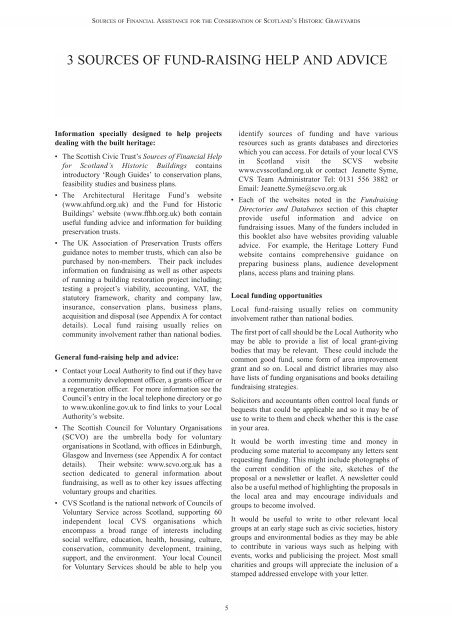get download - Carved Stones Advisor Project
get download - Carved Stones Advisor Project
get download - Carved Stones Advisor Project
Create successful ePaper yourself
Turn your PDF publications into a flip-book with our unique Google optimized e-Paper software.
SOURCES OF FINANCIAL ASSISTANCE FOR THE CONSERVATION OF SCOTLAND’S HISTORIC GRAVEYARDS<br />
3 SOURCES OF FUND-RAISING HELP AND ADVICE<br />
Information specially designed to help projects<br />
dealing with the built heritage:<br />
• The Scottish Civic Trust’s Sources of Financial Help<br />
for Scotland’s Historic Buildings contains<br />
introductory ‘Rough Guides’ to conservation plans,<br />
feasibility studies and business plans.<br />
• The Architectural Heritage Fund’s website<br />
(www.ahfund.org.uk) and the Fund for Historic<br />
Buildings’ website (www.ffhb.org.uk) both contain<br />
useful funding advice and information for building<br />
preservation trusts.<br />
• The UK Association of Preservation Trusts offers<br />
guidance notes to member trusts, which can also be<br />
purchased by non-members. Their pack includes<br />
information on fundraising as well as other aspects<br />
of running a building restoration project including;<br />
testing a project’s viability, accounting, VAT, the<br />
statutory framework, charity and company law,<br />
insurance, conservation plans, business plans,<br />
acquisition and disposal (see Appendix A for contact<br />
details). Local fund raising usually relies on<br />
community involvement rather than national bodies.<br />
General fund-raising help and advice:<br />
• Contact your Local Authority to find out if they have<br />
a community development officer, a grants officer or<br />
a regeneration officer. For more information see the<br />
Council’s entry in the local telephone directory or go<br />
to www.ukonline.gov.uk to find links to your Local<br />
Authority’s website.<br />
• The Scottish Council for Voluntary Organisations<br />
(SCVO) are the umbrella body for voluntary<br />
organisations in Scotland, with offices in Edinburgh,<br />
Glasgow and Inverness (see Appendix A for contact<br />
details). Their website: www.scvo.org.uk has a<br />
section dedicated to general information about<br />
fundraising, as well as to other key issues affecting<br />
voluntary groups and charities.<br />
• CVS Scotland is the national network of Councils of<br />
Voluntary Service across Scotland, supporting 60<br />
independent local CVS organisations which<br />
encompass a broad range of interests including<br />
social welfare, education, health, housing, culture,<br />
conservation, community development, training,<br />
support, and the environment. Your local Council<br />
for Voluntary Services should be able to help you<br />
identify sources of funding and have various<br />
resources such as grants databases and directories<br />
which you can access. For details of your local CVS<br />
in Scotland visit the SCVS website<br />
www.cvsscotland.org.uk or contact Jeanette Syme,<br />
CVS Team Administrator Tel: 0131 556 3882 or<br />
Email: Jeanette.Syme@scvo.org.uk<br />
• Each of the websites noted in the Fundraising<br />
Directories and Databases section of this chapter<br />
provide useful information and advice on<br />
fundraising issues. Many of the funders included in<br />
this booklet also have websites providing valuable<br />
advice. For example, the Heritage Lottery Fund<br />
website contains comprehensive guidance on<br />
preparing business plans, audience development<br />
plans, access plans and training plans.<br />
Local funding opportunities<br />
Local fund-raising usually relies on community<br />
involvement rather than national bodies.<br />
The first port of call should be the Local Authority who<br />
may be able to provide a list of local grant-giving<br />
bodies that may be relevant. These could include the<br />
common good fund, some form of area improvement<br />
grant and so on. Local and district libraries may also<br />
have lists of funding organisations and books detailing<br />
fundraising strategies.<br />
Solicitors and accountants often control local funds or<br />
bequests that could be applicable and so it may be of<br />
use to write to them and check whether this is the case<br />
in your area.<br />
It would be worth investing time and money in<br />
producing some material to accompany any letters sent<br />
requesting funding. This might include photographs of<br />
the current condition of the site, sketches of the<br />
proposal or a newsletter or leaflet. A newsletter could<br />
also be a useful method of highlighting the proposals in<br />
the local area and may encourage individuals and<br />
groups to become involved.<br />
It would be useful to write to other relevant local<br />
groups at an early stage such as civic societies, history<br />
groups and environmental bodies as they may be able<br />
to contribute in various ways such as helping with<br />
events, works and publicising the project. Most small<br />
charities and groups will appreciate the inclusion of a<br />
stamped addressed envelope with your letter.<br />
5




